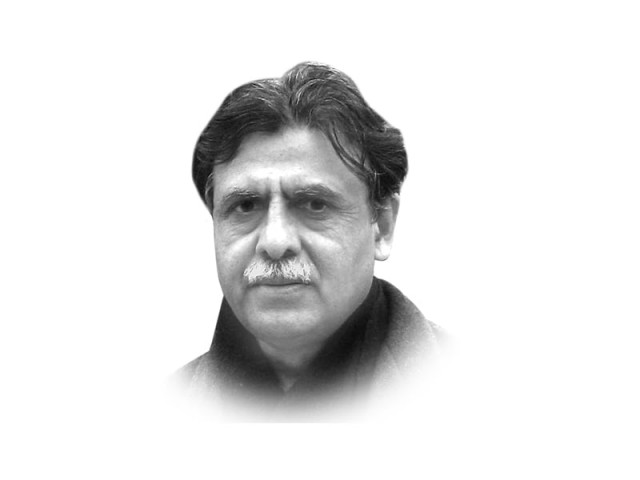Is liberté absolute?
Fraternité is not what Charlie Hebdo stands for, it is what Merabet and Bathily did for the Republic.

The writer is an author, a public policy analyst and teaches at the Suleman Dawood School of Business, LUMS
The savage attacks against the French weekly and the Jewish supermarket, resulting in the loss of so many lives had the obvious jihadist footprints that had links far beyond France. Muslims all over France and in many parts of Europe are in utter shock and disbelief, with lurking fears of being subjected to more profiling, more stereotyping and more social intimidation in times to come. France, as a country with a rich cultural heritage, has readily fallen back on its spiritual foundations — linking its national resolve to the three eternal principles of the French Republic: liberté, égalité, fraternité. It is indeed going back to the philosophic plank of the French Revolution — an event that transformed the course of modern history. The recent brutal attack is being considered as an attack on these key pillars of the Republic. It was liberté which guaranteed free expression, the manifestation of man's individuality. Ever since the Declaration of the Rights of Man and of the Citizen, liberté had been the ultimate end — the excellence to think freely and the freedom to do anything that did not harm others.
The same declaration also underscored the significance of égalité — equality before the law. Liberté was the higher end and required a clear pathway in order to be achieved. Keeping the intent and spirit of the declaration intact, the means to achieve this ideal was only through fraternité — which requires an unflinching bond with the community and fellow beings. While liberté was the end, fraternité was the way forward, which could help achieve it. This mandated meeting the obligations to the community one lived in.
While liberté is both a right and a privilege, fraternité is the obligation and responsibility. In this continuum, one cannot enjoy any right without sharing the commensurate responsibility. Nothing is more relevant today than a correct understanding of this nuance in a complex multicultural society like France. The country, as of today, is a diverse mix of different races, religions and cultures, with each group seeped in its own traditions. For instance, the bodies of the four French Jews, who lost their lives in the shootout in the supermarket, were airlifted to Israel for burial. This is just one glaring example of cultural particularism in France. The country has the largest Muslim population in the European Union of over six million. It has the largest black population, which exceeds two million. It also has the largest Jewish population, mostly Sephardic Jews. Multiculturalism in France, in a way, is deeply rooted in the history of the extractive relationship between the country’s colonial outposts and Metropolitan France. Unlike the ‘economic colonies' of the British Empire, France boasted of 'settlement colonies'. At one stage, nearly a million French men had been living in Algeria even during the civil war. With decolonisation, a process of immigration from the colonies gained pace.
The value of the three abovementioned principles needs to be seen in the ever-evolving multicultural context. The three values are closely inter-connected while opinion-makers in France wish to see the principal of liberté on a standalone basis. In a pluralistic society, liberté and freedom cannot be sustained over time while overlooking the broad overlap of the principal of fraternité. The persistent irreverence of Charlie Hebdo cannot be condoned in the name of free speech, with intense and persistent protests by mainstream Muslims. A line has to be drawn between free speech and hate speech. What if someone comes up with a counter-narrative on the Holocaust? Would the French media and state organs tolerate that narrative? A rare display of fraternité was given by Ahmed Merabet, the Muslim policeman who laid down his life while trying to stop the Charlie Hebdo attackers from escaping. The bravery of yet another Muslim, Lassana Bathily was also an enviable display of fraternité. At the Jewish store where Bathily worked, a scene of hostage-taking on gun-point, he risked his life by whisking away terror-stricken customers to a chiller to save their lives. Fraternité is not what Charlie Hebdo stands for. Fraternité is what Merabet and Bathily did for the Republic.
France needs to take care of its backyard. The Kouachi brothers were the products of a ghetto culture where the ideology of hate and revenge flourished, which is what ultimately fosters violence and militancy. Muslims in France must also mull over the problem of strengthening their compact with their homeland. They have reasons to feel hurt but there are more persuasive ways to bring the state and society to understand their point of view.
Published in The Express Tribune, January 27th, 2015.
Like Opinion & Editorial on Facebook, follow @ETOpEd on Twitter to receive all updates on all our daily pieces.















COMMENTS
Comments are moderated and generally will be posted if they are on-topic and not abusive.
For more information, please see our Comments FAQ